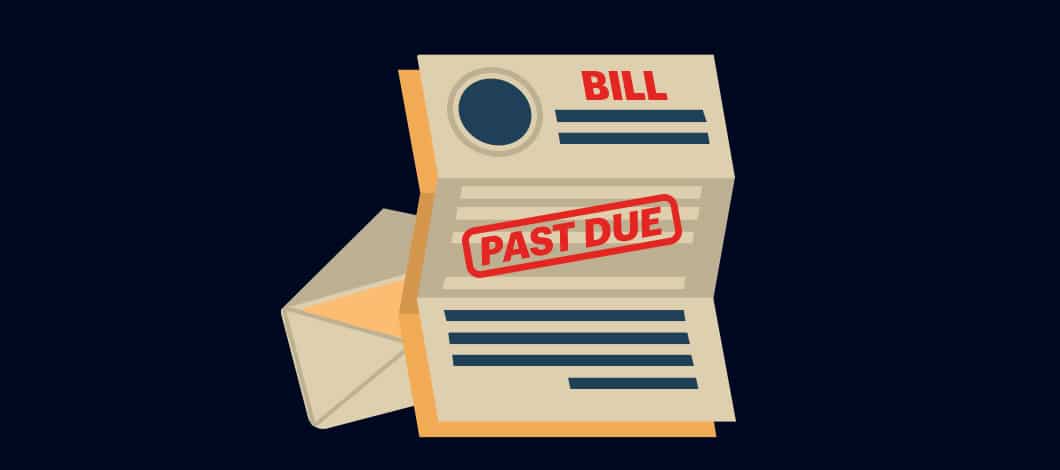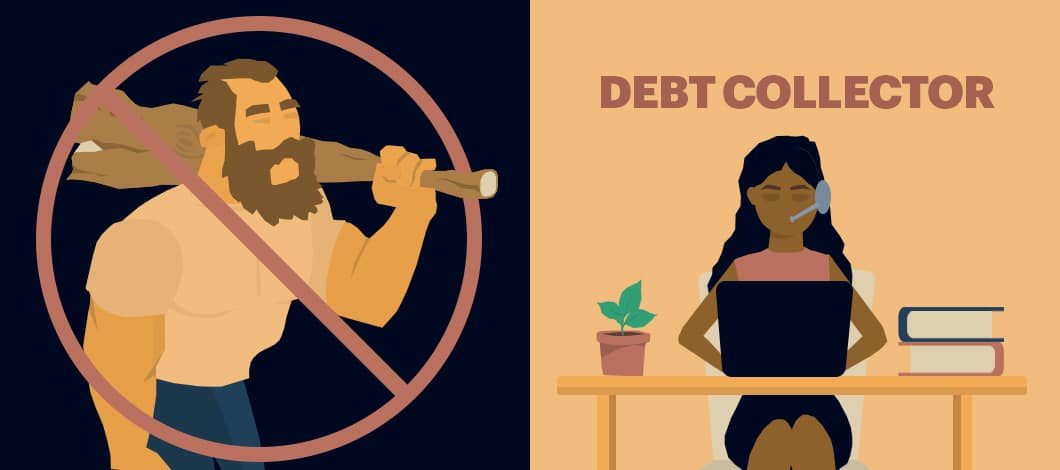Hiring a collection agency may be necessary when you can’t get clients to pay.
With that in mind, here’s what you need to know about using such a service.
So, What Is a Debt Collection Agency?
A debt collection agency recovers money owed by debtors whose accounts have gone delinquent for an extended period.
Third-party collection agency services fall into a couple of categories:
- Debt collectors
- Debt buyers
So, which type of agency does a creditor hire? It depends partly on how much money they expect to recover and how much money and time they are willing to invest in recovering it.
Debt Collectors
Debt collectors seek to recover money on behalf of the original creditor. They may do this by contacting debtors on the creditor’s behalf or by filing court action if debtors fail to pay. And here’s the important part: The money they collect goes to the creditor.
Yes, debt collectors make money by charging a fee for their services. And depending on the arrangement, this fee may be a contingency fee taken as a cut upon collection (also known as “no payment no fee” and typically about 20% to 35% of the amount to be collected) or a flat fee paid in advance (usually about $15 to $25 per account). A creditor may be willing to pay this fee if they believe it will help them recover more money or obtain money more quickly and easily than if they tried to collect it on their own.
Debt Buyers
Debt buyers purchase debt from the original creditor and then seek to recover it from the debtor on their own behalf. Also, they purchase the debt for a small percentage of the original amount, typically about 4% of the value of the debt to be collected.
The original creditor receives a fraction of the debt’s value. A creditor may be willing to accept this loss if they don’t expect to see any timely results from debt collection and they need cash now.

How Do Debt Collection Services Work?
When you hire a professional debt collector, either you agree to pay the company a contingency fee taken out of what it collects or you pay a flat fee upfront. In the case of a debt buyer, you sell the business your debt.
Next, you turn the customer’s account information over to the collection agency. The collection agency may take actions to contact debtors such as:
- Calling
- Writing letters
- Sending emails
- Sending text messages
- Trying to locate debtors who have moved without leaving a forwarding address (a type of private investigation known as skip tracing)
- Offering a collection agency payment plan to persuade debtors to settle for paying part of what they owe
Should these actions fail, debt collectors may file lawsuits or seek a court order to have the debtor’s wages garnished.
Prohibited Practices
The tactics debt collectors may use are governed by the Fair Debt Collection Practices Act (FDCPA), which is enforced by the Federal Trade Commission (FTC). Collection agencies may not use abusive, unfair or deceptive practices, including:
- Contacting debtors at inconvenient times or locations
- Reaching out to debtors before 8 a.m. or after 9 p.m. without permission
- Contacting debtors at work after being told the individual isn’t allowed to receive calls at work
- Using threats, obscene language or continuous phone harassment
- Misrepresenting the amount owed
- Impersonating an attorney or a representative of a government agency
- Threatening legal action or arrest if there is no actual risk of such action
- Trying to collect additional fees such as interest not allowed by state law
- Depositing post-dated checks before the date shown
- Taking property or threatening to take property in an illegal way
Debt collectors who violate the FDCPA can be reported to the FTC, the Consumer Financial Protection Bureau or state attorneys general. Additionally, they can be sued. However, even if they are sued successfully, the debtor still owes their debt.
Ending Debt Collection Agreements
Some debt collection contracts may include a clause called a termination clause specifying conditions under which the terms of the contract can be nullified.
For example:
- You may be able to end the contract by giving notice or paying a fee within a specified time frame
- The collection agency may be required to collect debt by a set deadline in order to be eligible for their fee
If a contract doesn’t have a termination clause, you can seek to negotiate one before agreeing to it. And even if a contract doesn’t have a termination clause, you may be able to end a contract. For example, if the collection agency hasn’t met obligations laid out in the agreement, this may be grounds for declaring them in breach of contract.
Alternatively, you can request to pay a cancellation fee if you wish to get out of a contract because you are dissatisfied with a collector’s service.
When Should You Hire a Collection Agency?
Hiring a collection agency always means settling for less than the amount you’re owed as you either pay a fee or you sell your debt for less than its original value. Because of this, companies normally hire collection agencies only after they’ve made reasonable efforts to collect money from debtors on their own.
These efforts can include:
- Preemptively sending customers reminders as bill due dates approach
- Sending reminders to customers who have failed to pay their bills
- Allowing customers a grace period to pay without penalty
- Charging a late fee for customers whose accounts have gone past their grace period as an incentive to pay on time
- Sending the debtor a “demand of payment” letter, which is an official notification that you intend to pursue collection action if they have not paid within a set period of time
Only after these steps have been taken should hiring a collection agency be considered.
When Hiring a Debt Collector Makes Sense
Hiring a small business debt collection agency may be the best move if:
- The amount you are owed is enough to make collection worthwhile
- A collector or debt buyer could help you recover some of what you’re owed
- The fee you would pay a collector represents less of a loss than pursuing collection action on your own represents, either in terms of money or lost time
- You need to collect debt regularly on a scale that would make it impractical for you to pursue your own debt collection action
If one or more of these criteria apply, debt collection may represent the best way to cut your losses.
Which Type of Debt Collection Service Should You Hire?
If you decide to go with a debt collection provider, you’ll need to determine which type of collector to hire.
Also, you have several options based on what type of situation you’re facing:
- Early in the debt-collection process: If the creditor’s account hasn’t gone delinquent a long time and they don’t owe much money, hiring a collector who charges a small flat fee may be cost-efficient
- For accounts that have been delinquent longer and represent higher amounts of money, hiring a collector who charges a contingency fee due upon collection may help you recover the majority of what you’re owed
- For accounts that have gone delinquent long enough that hope of collecting seems dim, selling debt to a debt buyer may be a way to salvage at least some of what you’re owed
Which scenario applies can help you determine which type of collection service to hire.

How Much Are Collection Agency Fees?
Collection agencies use a couple of common pricing methods:
- Contingency fees
- Flat fees
The most common arrangement is a contingency fee paid upon collection based on a percentage of the amount owed. Contingency fees vary based on a number of variables, including:
- How long the account has been delinquent
- How much is owed
- What industry you’re in
- Whether you’ll be paying for collection services in volume
Contingency fees average 20% to 35% of the amount collected, according to consumer and commercial collection agency Fair Capital.
The other common pricing model is a flat fee charged upfront per account to be collected. Flat fees typically range from $15 to $25 per account.
Debt buyers pay an average of 4 cents per dollar of debt collected, a study by the FTC found.
What Should You Look for When You Compare Collection Agencies?
Choosing the right collection agency will improve your chances of recovering what you’re owed. With that in mind, here are some items to consider when shopping for private debt collectors:
- Do they specialize in the type of debt you’re trying to collect? (For example, are they collecting from consumer debtors versus business debtors? Or are they collecting in a specific industry)?
- Can they do skip tracing to locate debtors who have changed addresses?
- What are their fees?
- Are they licensed in your state if required? (Check with your state’s attorney general or consumer affairs department for details.)
- Do they carry insurance in case your debtor sues you (known as errors and omissions insurance)?
- Do they have a reputation for complying with FDCPA regulations against unethical practices?
- How will they work with you?
The last couple of considerations underscore something important: When you hire a collection agency, that company’s behavior reflects on your business. If the agency you hire engages in unethical or illegal practices, your business may suffer as a result. So, doing due diligence before hiring a collector can help you protect your reputation and shield you from liability as well as recover your money.
Recovering What You’re Owed
A collection agency can help you recover some or all of what you’re owed by clients who don’t pay. Collection agencies may negotiate payment plans with your debtors, pursue legal action to collect fees or buy debt accounts from you.
Hiring a collection agency is typically a last resort after attempting to collect on your own through means such as payment reminders and letters of demand. Debt collectors may charge contingency fees or flat fees depending on how far along you are in the debt collection process. Different agencies specialize in different types of debt collection. Seek one that’s experienced in handling the type of debt you’re owed.










